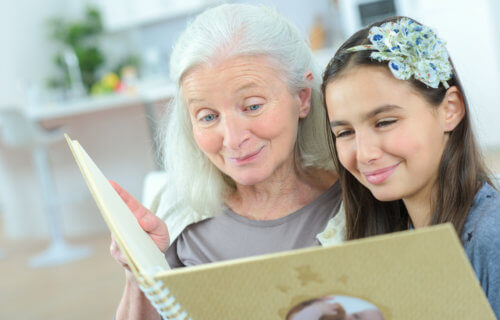
Grandmothers feel their grandkids’ emotions when looking at photos of them
DECEMBER 4, 2021
by Study Finds
ATLANTA — Grandmothers feel the same emotions their grandkids are feeling when they look at pictures of them, according to a recent study. Scientists reveal that if a grandchild is smiling in an image, grannies feel their joy. But if the youngster is crying, they share their pain and distress.
The groundbreaking study is the first to examine the brain function of grandmothers. The part of the brain associated with emotional empathy “lights up” when they look at images of their grandkids, anthropologists at Emory University found.
Fifty healthy, “high-functioning” grandmothers who took part in the study answered questions about their experiences in grandparenthood. Questions included how much time they spend with their grandkids, what they do with them, and how much love they feel towards them. They also underwent MRI scans as they viewed pictures of their grandchild, a child they had never met, the same-sex parent of their grandchild, and an unknown adult.
The scans showed the grandmothers had more brain activity in areas associated with empathy and movement when they looked at their own grandchildren, compared with when they looked at the other images. Grandmothers showed more emotional empathy and motivation when they looked at their grandkids than fathers did when they looked at their children in an earlier study. Those who showed more cognitive empathy were more likely to want to be more involved in caring for their grandchild.
“What really jumps out in the data is the activation in areas of the brain associated with emotional empathy. That suggests that grandmothers are geared toward feeling what their grandchildren are feeling when they interact with them. If their grandchild is smiling, they’re feeling the child’s joy. And if their grandchild is crying, they’re feeling the child’s pain and distress,” explains study lead author James Rilling, a professor in Emory’s Department of Anthropology and Department of Psychiatry and Behavioral Sciences, in a statement. “Young children have likely evolved traits to be able to manipulate not just the maternal brain, but the grand maternal brain. An adult child doesn’t have the same cute ‘factor,’ so they may not elicit the same emotional response.”
More research needed in the study of grandmothers’ brains
Researchers have rarely studied older people’s brains beyond the realms of aging and dementia research, and grandmothers’ interactions with their grandkids had not been studied before. Scientists believe women live long past menopause because it helps their children and grandchildren.
A study of the Hadza people in Tanzania found foraging by grandmothers helps their grandchildren grow up more healthily. Another study of traditional communities showed the presence of grandmothers cut their daughters’ interbirth intervals and helped their daughters have more children. In more modern societies, evidence is growing that grandmothers help their grandchildren, making the little ones brainier, more sociable, and healthier.
“Evidence is emerging in neuroscience for a global, parental caregiving system in the brain. We wanted to see how grandmothers might fit into that pattern,” says Rilling. “We often assume that fathers are the most important caregivers next to mothers, but that’s not always true. In some cases, grandmothers are the primary helper. Our results add to the evidence that there does seem to be a global parenting caregiving system in the brain, and that grandmothers’ responses to their grandchildren map onto it.”
Rilling adds that the research was fun and gave him a better sense of the rewards and challenges of being a grandma. The main difficulty many grandmothers face is trying not to interfere when they disagree with the parents about how the grandkids should be raised and what values should be installed into them.
“Many of them also said how nice it is to not be under as much time and financial pressure as they were when raising their children. They get to enjoy the experience of being a grandmother much more than they did being parents,” says Rilling.
The findings open the door to many more questions. Rilling notes he now wants to study grandfathers’ brains and look into how grandparents’ brains may differ across cultures.
“We’re highlighting the brain functions of grandmothers that may play an important role in our social lives and development. It’s an important aspect of the human experience that has been largely left out of the field of neuroscience,” says co-author Minwoo Lee, a PhD candidate in Emory’s Department of Anthropology.
The study is published in the journal Proceedings of the Royal Society B.
South West News Service writer Gwyn Wright contributed to this report.
No comments:
Post a Comment